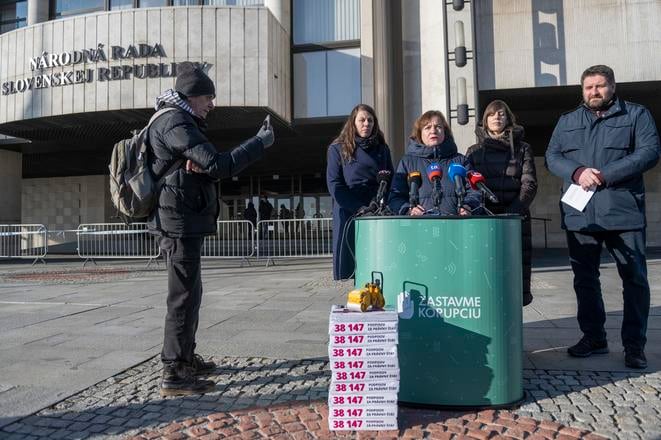From April 2025, businesses in Slovakia will face a new financial transaction tax of 0.4 percent per payment, capped at €40. ATM withdrawals will incur a doubled rate of 0.8 percent, with no upper limit. Meanwhile, a €2 annual fee will be levied for the use of payment cards by entrepreneurs.
The tax, part of a fiscal consolidation package, was initially set to include non-profits and charities. However, after parliamentary revisions, the non-profit sector—often targeted by Robert Fico’s government—has been exempted entirely.
Finance Minister Ladislav Kamenický (Smer) initially suggested refunds for select non-profits, while Labour Minister Erik Tomáš (Hlas) proposed excluding public-benefit organisations. Yet, with over 80,000 non-profits in Slovakia, determining eligibility proved unfeasible. Instead, a blanket exemption for the sector was introduced, Denník N writes.
Civic associations, foundations, and non-profit organisations will, however, be exempt from paying transaction tax only if they meet specific conditions, such as those related to their legal form and type of activity. They must also notify the bank - by March 2025 - that they are not required to pay the tax.
Non-profit organisations exempt from the financial transaction tax:
civic associations,
foundations,
non-investment funds,
non-profit organisations providing public-benefit services,
purpose-built facilities of churches and religious communities,
interest associations of legal entities,
research and development entities,
organisations with an international element,
the Slovak Red Cross.
Source: Income Tax Act
“Each bank may have its own procedure. You need to contact the bank, request a sample notification, and obtain a list of documents required to verify the legal status and activities of the non-profit organisation,” tax advisor Marcela Bošková told Denník N.
The law does not address situations where a non-profit delivers its notification to the bank late. However, without the notification, the bank will deduct the tax and will only stop doing so the day after the notification is received.
What activities must non-profits undertake to be exempt from the tax:
health protection and promotion, including prevention, treatment, and rehabilitation,
support and development of sports,
provision of social assistance,
preservation of cultural heritage,
support for education,
protection of human rights,
environmental protection,
science and research,
organisation of volunteer activities.
Further exemptions
Additional exemptions cover organisations like cultural institutions and tourism bodies that operate within public spending limits but not primarily for profit.
Critics, including the European Central Bank (ECB), have raised concerns about the tax’s impact on monetary policy and financial stability. In response, operations tied to the National Bank of Slovakia’s monetary policy will be exempt, Denník N adds.
Despite these changes, the transfer of payments such as employee salaries remain taxable. However, several other payment operations have now been added to the list of exceptions.
Payments exempt from the transaction tax:
payments made by court bailiffs and bankruptcy administrators related to auction deposits held in special accounts;
certain payment operations linked to public procurement, public tenders, and financial guarantees;
transfers from state funds and legally established funds, particularly in the fields of culture, the arts, health protection, and environmental preservation;
payment operations conducted by public universities that are unrelated to commercial activities;
payments of taxes, contributions, fees, and levies that contribute to the state budget or customs duties;
transfers by securities traders;
transfers by Slovenská Pošta, the state-owned postal services provider.
Also, if companies pay from accounts in domestic banks, these banks will collect the tax. If payments are made from foreign banks, the companies will need to declare them in their tax returns.


 Representatives of NGOs handed a public appeal to the Speaker of Parliament, Peter Pellegrini, calling for an end to the erosion of the rule of law, along with 38,147 signatures from Slovak citizens, on January 10, 2024 in Bratislava. (source: TASR)
Representatives of NGOs handed a public appeal to the Speaker of Parliament, Peter Pellegrini, calling for an end to the erosion of the rule of law, along with 38,147 signatures from Slovak citizens, on January 10, 2024 in Bratislava. (source: TASR)